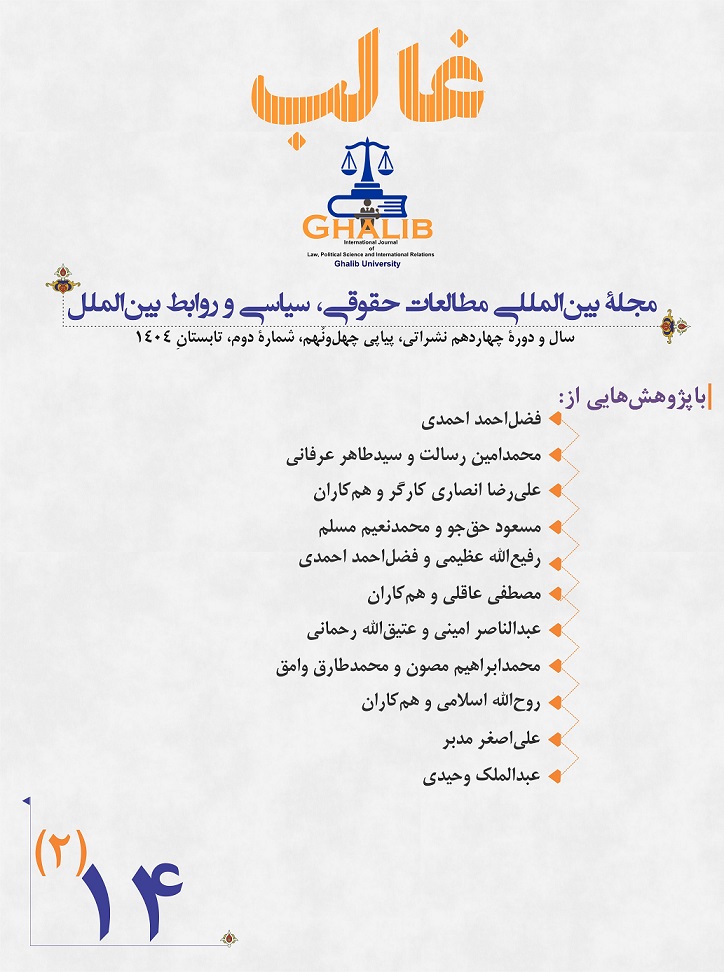The Role of Imam al-Shaybani in the Codification and Development of Islamic International Law
DOI:
https://doi.org/10.58342/ghalibqj.V.14.I.2.1Keywords:
Imam Muhammad al-Shaybani, Islamic International Law, Islamic Jurisprudence, Codification of Law, Development of Islamic Law, Hanafi JurisprudenceAbstract
The Islamic legal system is frequently regarded as one of the most sophisticated legal frameworks in human civilization, offering comprehensive regulations for various dimensions of human life. Among these dimensions is Islamic international law, which has gradually developed and been codified over time. A fundamental question in this regard concerns the extent to which Muslim jurists—particularly Imam Muhammad al-Shaybani—have contributed to the codification and development of this field. While scholarship in Islamic international law differs considerably from other branches of Islamic jurisprudence—demanding a dual perspective that encompasses both national-religious and international-trans-sectarian dimensions—only a select group of jurists have possessed the intellectual and methodological capacity to address this domain. Against this backdrop, the present study investigates the specific role of Imam Muhammad ibn al-Hasan al-Shaybani in shaping Islamic international law. Methodologically, the research adopts a qualitative, descriptive-analytical approach based on library resources. After gathering relevant data, the study analyzed the subject and its core issues. The findings indicate that Imam al-Shaybani was the first to produce well-structured and thematically organized legal texts on Islamic international law. His pioneering efforts earned him recognition as the founder of this discipline within the broader framework of Islamic jurisprudence.
References
Holy Quran.
Ibn Manzur, Muhammad ibn Mukarram. (2008). Lisan al-ʿArab, Vol. 2. Beirut, Lebanon: Dar al-Fikr. [In Arabic]
Abu Zahrah, Muhammad. (1947). Abu Hanifa: His Life, Era, Views, and Jurisprudence. Publisher: Dar al-Fikr al-ʿArabi, Electronic Version. [In Arabic]
Abu Zahrah, Muhammad & Abdulkarim Zaydan. (2013). Islam and International Relations. Translated by Nematullah Shahrani. Kabul: Khorasan Publishing. [In Persian]
al-Jundi, Abdulhalim. (1966). Abu Hanifa: Hero of Freedom and Tolerance in Islam, 23rd ed. Cairo, Egypt: Dar al-Maʿarif. [In Arabic]
Haji Khalifa, Mustafa ibn Abdullah. (n.d). Kashf al-Ẓunūn ʿan Asāmī al-Kutub wa al-Funūn, Vol. 2. Beirut, Lebanon: Dar Ihyaʾ al-Turath al-ʿArabi. [In Arabic]
Hamidullah, Muhammad. (2020). The International Conduct of the Islamic State, 3rd ed. Translated by Sayyid Mostafa Mohaqqeq Damad. Tehran: Center for the Publication of Islamic Sciences. [In Persian]
Hawwa, Ahmad Said. (2002). Introduction to the School of Imam Abu Hanifa al-Nuʿman. Jeddah, Saudi Arabia: Dar al-Andalus al-Khadra. [In Arabic]
Khalilian, Seyyed Khalil. (2003). Islamic International Law, 10th ed. Tehran: Daftar Nashr-e Farhang-e Eslami. [In Persian]
al-Dusuqi, Muhammad. (1978). Imam Muhammad ibn al-Hasan al-Shaybani and His Contribution to Islamic Jurisprudence. Doha, Qatar: Dar al-Thaqafa. [In Arabic]
al-Dhahabi, Imam al-Hafiz Abu Abdullah Muhammad ibn Ahmad ibn ʿUthman. (1988). Merits of Imam Abu Hanifa and His Companions Abu Yusuf and Muhammad ibn al-Hasan, 3rd ed. Beirut, Lebanon: Committee for the Revival of Nuʿmanī Knowledge. [In Arabic]
al-Zuhayli, Wahbah. (2006). Islamic Jurisprudence and Its Proofs, Vol. 8, 3rd ed. Tehran: Nashr-e Ehsan. [In Arabic]
al-Sarakhsi, Shams al-Din. (1906). Al-Mabsut, Vol. 10. Egypt: Saʿadah Press. [In Arabic]
Shaybani, Muhammad ibn al-Hasan. (2020). Kitab al-Siyar (A Study in Islamic International Law). Translated, Introduced, and Annotated by Sayyid Hashem Mousavi Abgarm. Tehran: Nashr-e Ehsan. [In Persian]
Shaybani, Muhammad ibn al-Hasan. (2010). Siyar-e Shaybani (Islamic Law of International Relations). Translated and Annotated by Hossein Piran. Tehran: Ganj-e Danesh Publishing. [In Persian]
Safdar, Sarfaraz Khan. (2019). Imam Abu Hanifa and His Practical Status. Translated by Abdolhafiz Zahedi (Molazahi). Zahedan: Sarvach Publishing. [In Persian]
al-Saymari, Judge Abu Abdullah Husayn ibn ʿAli. (n.d). Akhbar Abi Hanifa wa Ashabihi. Place unknown: Al-Khizānah al-Fiqhiyyah. [In Arabic]
Ziaei Bigdeli, Mohammad Reza. (2014). Islam and International Law, 11th ed. Tehran: Ganj-e Danesh Publishing. [In Persian]
Abdullah, Ahmad Ismail. (2005). “Muhammad ibn al-Hasan al-Shaybani: His Life and Jurisprudential Contributions.” Journal of the College of Basic Education Research, Vol. 2, No. 4. [In Arabic]
Amid Zanjani, Abbas Ali. (2013). Principles of Jurisprudence: Section on International Law, Vol. 4. Tehran: SAMT Publishing. [In Persian]
al-Fahdawi, Khalid. (2008). Islamic Political Jurisprudence, 3rd ed. Syria - Damascus: Dar al-Awaʾil. [In Arabic]
al-Kawthari, Muhammad Zahid ibn al-Hasan. (1936). Balugh al-Amānī fī Sīrah al-Imam Muhammad ibn al-Hasan al-Shaybani. Egypt: Maktabat al-Khanji wa Matbaʿatuha. [In Arabic]
al-Laknawi, Shaykh Muhammad Abdul Hayy al-Laknawi al-Hindi. (1998). Majmūʿat Rasāʾil al-Laknawi. Pakistan: Idarat al-Qurʾan wa al-ʿUlum al-Islamiyyah. [In Arabic]
al-Nadwi, Ali Ahmad. (1994). Muhammad ibn al-Hasan al-Shaybani (A Genius of Islamic Jurisprudence). Damascus: Dar al-Qalam. [In Arabic]
al-Naqib, Ahmad ibn Muhammad Nasir al-Din. (2001). The Hanafi School, Part One: Its Stages, Classifications, Terminologies, Characteristics, and Writings. Riyadh: Maktabat al-Rushd. [In Arabic]
Baderin, Mashood A. (2012). The Oxford Handbook of the History of International Law. Edited by Bardo Fassbender and Anne Peters. Print Publication.
Downloads
Published
How to Cite
Issue
Section
License
Copyright (c) 2025 فضلاحمد احمدی

This work is licensed under a Creative Commons Attribution 4.0 International License.













